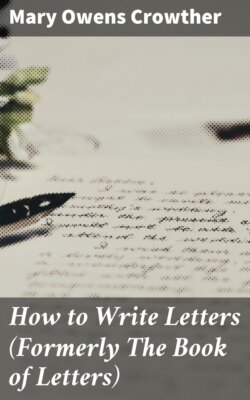Читать книгу How to Write Letters (Formerly The Book of Letters) - Mary Owens Crowther - Страница 37
На сайте Литреса книга снята с продажи.
Invitations and Acknowledgments
ОглавлениеTable of Contents
General Directions
The format of an invitation is not so important as its taste. Some of the more formal sorts of invitations—as to weddings—have become rather fixed, and the set wordings are carried through regardless of the means at hand for proper presentation. For instance, one often sees a wedding invitation in impeccable form but badly printed on cheap paper. It would be far better, if it is impossible to get good engraving or if first-class work proves to be too expensive, to buy good white notepaper and write the invitations. A typewriter is, of course, out of the question either for sending or answering any sort of social invitation. Probably some time in the future the typewriter will be used, but at present it is associated with business correspondence and is supposed to lack the implied leisure of hand writing.
The forms of many invitations, as I have said, are fairly fixed. But they are not hallowed. One may vary them within the limits of good taste, but on the whole it is considerably easier to accept the forms in use and not try to be different. If the function itself is going to be very different from usual then the invitation itself may be as freakish as one likes—it may be written or printed on anything from a postcard to a paper bag. The sole question is one of appropriateness. But there is a distinct danger in trying to be ever so unconventional and all that. One is more apt than not to make a fool of one's self. And then, too, being always clever is dreadfully hard on the innocent by-standers. Here are things to be avoided:
Do not have an invitation printed or badly engraved. Hand writing is better than bad mechanical work.
Do not use colored or fancy papers.
Do not use single sheets.
Do not use a very large or a very small sheet—either is inappropriate.
Do not have a formal phraseology for an informal affair.
Do not abbreviate anything—initials may be used in informal invitations and acceptances, but, in the formal, "H. E. Jones" invariably has to become "Horatio Etherington Jones."
Do not send an answer to a formal invitation in the first person.
A formal invitation is written in the third person and must be so answered.
Do not use visiting cards either for acceptances or regrets even though they are sometimes used for invitations. The practice of sending a card with "Accepts" or "Regrets" written on it is discourteous.
Do not seek to be decorative in handwriting—the flourishing Spencerian is impossible.
Do not overdo either the formality or the informality.
Do not use "R.S.V.P." (the initials of the French words "Répondez, s'il vous plaît," meaning "Answer, if you please") unless the information is really necessary for the making of arrangements. It ought to be presumed that those whom you take the trouble to invite will have the sense and the courtesy to answer.
In sending an evening invitation where there are husband and wife, both must be included, unless, of course, the occasion is "stag." If the invitation is to be extended to a daughter, then her name is included in the invitation. In the case of more than one daughter, they will receive a separate invitation addressed to "The Misses Smith." Each male member of the family other than husband should receive a separately mailed invitation.
An invitation, even the most informal, should always be acknowledged within a week of its receipt. It is the height of discourtesy to leave the hostess in doubt either through a tardy answer or through the undecided character of your reply. The acknowledgment must state definitely whether or not you accept.
The acknowledgment of an invitation sent to husband and wife must include both names but is answered by the wife only. The name of a daughter also must appear if it appears in the invitation. If Mr. and Mrs. Smith receive an invitation from Mr. and Mrs. Jones, their acknowledgment must include the names of both Mr. and Mrs. Jones, but the envelope should be addressed to Mrs. Jones only.
